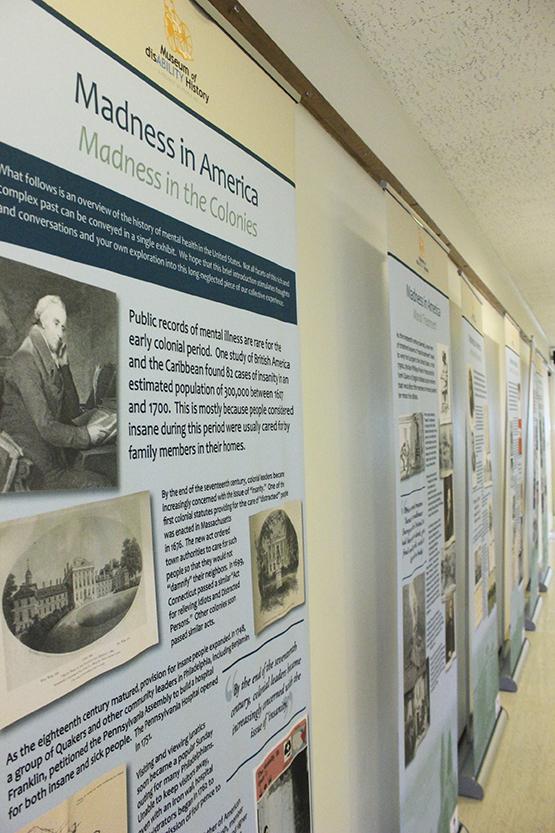Expanding knowledge of mental illness during awareness week
October 15, 2014
Mental Illness Awareness Week, Oct. 5 through Oct. 11, shines a light on a sector of health that affects over 60 million Americans, according to the Anxiety and Depression Association of America. People fighting to create awareness for those suffering from mental illnesses are faced with a history of stigma and hardship.
That history is summarized in the exhibition “Madness in America: A History of Mental Health,” by the Museum of disABILITY History, now being shown in the circulation gallery of the E. H. Butler Library. The seven-panel informative exhibition gives a history of the development of mental institutions in the United States, the changes in medical care and treatment of the illnesses and contributions by individuals who received these mental health services. Coinciding with the awareness week, museum curator Doug Platt hopes to create a dialogue that will lead to more open discussion about the issues those with all types of disabilities face.
“We all have our challenges,” Platt said. “Some are just in different areas. We hope to provide a context for what is going on now in the mental health field, and hopefully lead to a more integrated, diverse, understanding and accepting society.”
SUNY Buffalo State’s counseling center in the Weigel Health Center has taken its own form of support outside of the services they already provide for those seeking help.
The “Buffalo State Cares: Suicide Prevention” initiative focuses on QPR (question, persuade, respond) Gatekeeper training in an attempt to widen the breadth of the community to support those needing assistance.
“Once someone is connected to the mental health world, they are much better at seeing the signs of distress and more adept to respond to the problem,” said Joan McCool, director of the counseling center.
McCool says that though a short-staffed counseling center may not have the ability to hold large scale events to promote awareness, educating anyone willing to help goes very far in expanding the support system at Buffalo State.
“It is really everyone’s issue,” McCool said. “No one should be unaware of these illnesses’ significance.”
Reaching beyond the boundaries of the Buffalo State campus, those looking to teach the next generation have references such as the exhibition to educate and observe the students they will teach.
“It’s becoming more important to see the signs and not ignore them,” said Catherine Conway, graduate secondary science education student. “So much can be done to give everyone a better future.”
While Mental Illness Awareness Week may only be once a year, Platt said that there is far more to learn every day when people examine how mental health is seen in society.
“There is definitely still some degree of stigma, especially for mental illness,” Platt said. “But hopefully that will continue to change as people realize it is not a choice, and that with the right amount of support, therapy and understanding, these suffering people can lead more functional lives.”
Email: [email protected]




